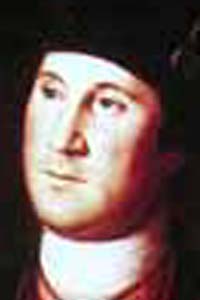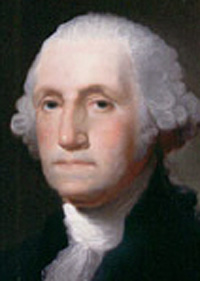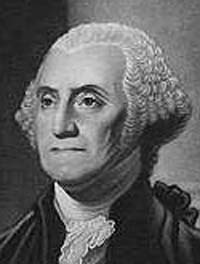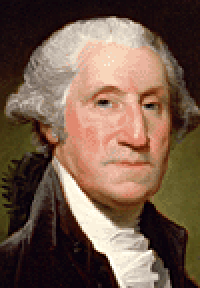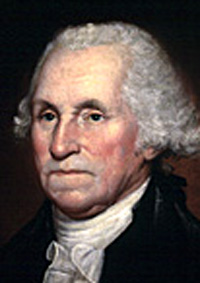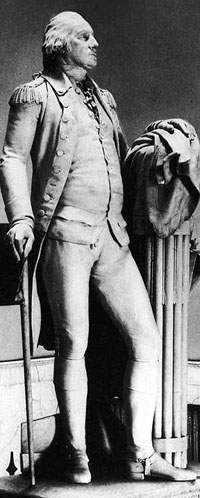George Washington
Copyright Michael D. Robbins 2005
Astro-Rayological
Interpretation & Charts
Quotes
Biography
Images and Physiognomic Interpretation
George Washington—First President of the United States
February 22, 1732, Wakefield, VA, 10:05 AM, LMT. (Source: Family Bible)
(Ascendant, Taurus; MC, Aquarius; Sun in Pisces; Moon in Capricorn; Mercury in Aquarius; Venus in Pisces; Mars in Scorpio conjunct the Descendant; Jupiter and Pluto in Libra; Saturn in Aries conjunct Venus in Pisces; Uranus and the NN in Sagittarius; Neptune in Gemini) (Need Washington’s character)
George Washington is known as the “Father of His Country”—the United States. Born in Virginia, he was the great grandson of an English setter. After serving as a militia officer in the French and Indian War (Mars in Scorpio), he became a planter (Taurus Ascendant). Washington was active in colonial politics on the eve of the American Revolution and, when fighting broke out, Congress named him commander in chief of the Continental Army. He undertook a huge military task with strength and dignity. His powers of endurance (Taurus/Vulcan) were tested to the maximum, but relying upon a deep faith (Pisces Sun) he and the Continental Army prevailed. Later he became the first president of the United States (clearly emblematic of his first ray soul) and served for two terms from 1789-1797.
The Tibetan speaks of the necessity of contending with the crystallizing and destroying forces of Vulcan and Pluto when passing through the first initiation (cf. EP I 246, EA 70) This is not to say that Washington, an advanced individual, was passing through this initiation, but Vulcan (the esoteric ruler of his Taurus Ascendant) and Pluto (the esoteric ruler of his Pisces Sun) were prominent in his chart. It may signal that he was instrumental in the initiation of his nascent country, or with certain individuals whose Uranian task it was, to create a nation actuated by hierarchical principles.
The first ray had many astrological conduits; first ray Saturn in first ray Aries; the Moon is first ray Capricorn; Taurus rising with first ray Vulcan ruling esoterically; first ray Pluto as the esoteric ruler of his Pisces Sun. Revolutionary Uranus (contradicting the conservatism of the Capricornian Moon) has its decided first ray component, and it is the ruler of his Aquarius MC. Mars (with its first ray, as well as sixth) in Scorpio, the sign of Hercules, is yet another and highly focussed channel for the first ray.
Certainly, Washington saw his fair share of destruction. His participation in the French and Indian Wars was not uneventful but bloody, as Mars in warlike Scorpio conjunct the seventh house cusp would indicate; the seventh house symbolizes, among other things, antagonistic relationships, enemies and confrontations.
There are strong suggestions of the seventh ray in Washington’s life, as well. He was as man of nature (Taurus and a proposed seventh ray which rules the land and the rhythmic nature of the seasons), a planter and plantation owner—a down to earth individual in many respects. Further, he was an avid Mason—the Master of his Masonic Lodge. There is a famous and dignified print entitled “George Washington Opening his Lodge”. The Masonic, ritualistic connection emphasizes the seventh ray. It would seem that he, too, was in some measure influenced by the ideas of the Count de St. Germain.It is interesting that Master Morya reports of a “professor” being assigned to Washington—a measure utilized by the Great Ones when the gifts of action outrun the gifts of consciousness. A similar “professor” appeared (occult rumor has it) as debate raged about whether or not to sign the Declaration of Independence. Some see in this professor the great Master R. (then known as the Count). There is something about the triangle Washington, Jefferson, Franklin which was responsive to the transformational vision of the Master R.
Astrologically, the chart is also rich in the fourth ray—with Mars in Scorpio, Uranus in Sagittarius and Taurus rising. Second ray potentials are also strong with Neptune in second ray Gemini and Venus in second ray Pisces—both Neptune and Pisces having strong second ray components.
Mercury in progressive Aquarius, and transformational Uranus in idealistic, forward-seeing Sagittarius (widely sextile to each other) gave him sympathy with the cause of revolution. Of course, he clearly had his conservative streak. He was a planter and land-owner, close to the earth. The Moon is in conservative Capricorn in the ninth house of world view, inclines towards orthodoxy, and cautious Saturn is conjunct Venus, the exoteric ruler of his Taurus Ascendant, but the larger issues of the day overrode the more reticent or retiring aspects of his nature (Sun and Venus in Pisces).
For the years of the American Revolution he found himself upon the field of battle. He met the English with his Scorpionic Mars (as well as with his clear-thinking, resourceful and intuitive mind—Neptune, Saturn and Uranus are all either loosely sextile or trine his elevated Aquarian Mercury). Pluto is the co-ruler of the seventh house of conflict, and Pluto is places in the sixth house of service in the sign of justice, Libra, conjunct Jupiter, the planet of success.His role in the American Revolutionary War was undertaken as an act of service (sixth house), and though death (Pluto) and violence (Mars) were fated (Pluto conjunct the Vertex, or point of fate), the outcome would be successful (Jupiter). The two rulers of liberating Aquarius (the sign of the MC) Uranus (exoteric) and Jupiter (esoteric) are sextile, and mutually supportive.
Certain incarnations are fated by soul design (Venus, the planet of the soul, conjunct Saturn, the planet of duty, dharma and fate); a powerful and capable individual finds himself or herself in the right place at the right time. Such an one was Lincoln, Roosevelt, Churchill. Such an one, as well, was Washington. He was cruelly tested in the winter hardships of Valley Forge. Only the greatest faith (Pisces) in his purpose and the purpose of his nascent nation could see him and his army through this desperate situation.It was during this experience that he was forced to call upon all his interior resources (and, who knows, perhaps he was strongly supported inwardly by certain members of the Hierarchy—the Count and Master M—who sought to see the new order which the United States represented firmly established. In any case, he endured (Vulcan) and prevailed (first ray), thereby establishing a nation which would provide a beacon light of hope for all humanity in years to come.
A slender acquaintance with the world must convince every man that actions, not words, are the true criterion of the attachment of friends.
Arbitrary power is most easily established on the ruins of liberty abused to licentiousness.
As Mankind becomes more liberal, they will be more apt to allow that all those who conduct themselves as worthy members of the community are equally entitled to the protections of civil government. I hope ever to see America among the foremost nations of justice and liberality.
Associate yourself with men of good quality if you esteem your own reputation. It is better be alone than in bad company.
Bad seed is a robbery of the worst kind: for your pocket-book not only suffers by it, but your preparations are lost and a season passes away unimproved.
Be courteous to all, but intimate with few, and let those few be well tried before you give them your confidence.
Discipline is the soul of an army. It makes small numbers formidable; procures success to the weak, and esteem to all.
Few men have virtue to withstand the highest bidder.
Friendship is a plant of slow growth and must undergo and withstand the shocks of adversity before it is entitled to the appellation.
Government is not reason; it is not eloquent; it is force. Like fire, it is a dangerous servant and a fearful master.
Happiness and moral duty are inseparably connected.
How soon we forget history... Government is not reason. Government is not eloquence. It is force. And, like fire, it is a dangerous servant and a fearful master.
I have no other view than to promote the public good, and am unambitious of honors not founded in the approbation of my Country.
I hope I shall possess firmness and virtue enough to maintain what I consider the most enviable of all titles, the character of an honest man.
I know of no pursuit in which more real and important services can be rendered to any country than by improving its agriculture, its breed of useful animals, and other branches of a husbandman's cares.
I walk on untrodden ground. There is scarcely any part of my conduct which may not hereafter be drawn into precedent.
If the freedom of speech is taken away then dumb and silent we may be led, like sheep to the slaughter.
If we desire to avoid insult, we must be able to repel it; if we desire to secure peace, one of the most powerful instruments of our rising prosperity, it must be known, that we are at all times ready for War.
It is far better to be alone, than to be in bad company.
It is our true policy to steer clear of entangling alliances with any portion of the foreign world.
It is the child of avarice, the brother of iniquity, and the father of mischief.
It may be laid down as a primary position, and the basis of our system, that every Citizen who enjoys the protection of a Free Government, owes not only a proportion of his property, but even of his personal services to the defense of it.
It will be found an unjust and unwise jealousy to deprive a man of his natural liberty upon the supposition he may abuse it.
Labor to keep alive in your breast that little spark of celestial fire, called conscience.
Lenience will operate with greater force, in some instances than rigor. It is therefore my first wish to have all of my conduct distinguished by it.
Let us raise a standard to which the wise and honest can repair; the rest is in the hands of God.
Let us with caution indulge the supposition that morality can be maintained without religion. Reason and experience both forbid us to expect that national morality can prevail in exclusion of religious principle.
Let your Discourse with Men of Business be Short and Comprehensive.
Let your heart feel for the afflictions and distress of everyone, and let your hand give in proportion to your purse.
Liberty, when it begins to take root, is a plant of rapid growth.
Mankind, when left to themselves, are unfit for their own government.
My first wish is to see this plague of mankind, war, banished from the earth.
My manner of living is plain and I do not mean to be put out of it. A glass of wine and a bit of mutton are always ready.
My mother was the most beautiful woman I ever saw. All I am I owe to my mother. I attribute all my success in life to the moral, intellectual and physical education I received from her.
My observation is that whenever one person is found adequate to the discharge of a duty... it is worse executed by two persons, and scarcely done at all if three or more are employed therein.
Observe good faith and justice toward all nations. Cultivate peace and harmony with all.
Over grown military establishments are under any form of government inauspicious to liberty, and are to be regarded as particularly hostile to republican liberty.
The constitution vests the power of declaring war in Congress; therefore no offensive expedition of importance can be undertaken until after they shall have deliberated upon the subject and authorized such a measure.
The foolish and wicked practice of profane cursing and swearing is a vice so mean and low that every person of sense and character detests and despises it.
The marvel of all history is the patience with which men and women submit to burdens unnecessarily laid upon them by their governments.
The time is near at hand which must determine whether Americans are to be free men or slaves.
The tumultuous populace of large cities are ever to be dreaded. Their indiscriminate violence prostrates for the time all public authority, and its consequences are sometimes extensive and terrible.
The very atmosphere of firearms anywhere and everywhere restrains evil interference - they deserve a place of honor with all that's good.
To be prepared for war is one of the most effective means of preserving peace.
True friendship is a plant of slow growth, and must undergo and withstand the shocks of adversity, before it is entitled to the appellation.
War - An act of violence whose object is to constrain the enemy, to accomplish our will.
We should not look back unless it is to derive useful lessons from past errors, and for the purpose of profiting by dearly bought experience.
When firearms go, all goes. We need them every hour.
When we assumed the Soldier, we did not lay aside the Citizen.
Worry is the interest paid by those who borrow trouble.
(February 22, 1732 – December 14, 1799) was an American planter, political figure, the highest ranking military leader in U.S. history and first President of the United States.
Born of English and Scottish descent into a moderately wealthy family in the Province of Virginia, Washington worked as a surveyor before inheriting his half-brother's plantation, Mount Vernon.
Washington first gained prominence as an officer during the French and Indian War, a war which he inadvertently helped to start. Afterwards, he resigned his post to marry Martha Dandridge Custis, a wealthy widow with two children. He was elected to the House of Burgesses and became a revolutionary leader at the outset of the American Revolution, attending both the first and second Continental Congresses. Washington was appointed Commander in Chief of the Continental Army in the American Revolutionary War (1775–83), leading the Americans to complete victory over the British, the only General ever to achieve this feat. After the war he served as president of the 1787 Constitutional Convention.
Washington, a hugely popular and generally nonpartisan figure, was elected as the first President of the United States (1789–97) after the U.S. Constitution was adopted. The two-term Washington Administration was marked by the establishment of key American institutions that continue to operate. After his second term was up, Washington retired to Mount Vernon for the remainder of his life, again voluntarily relinquishing power even as some wanted him to retain that power for life. Because of his central role in the founding of the United States and enduring legacy, Washington is sometimes called the "Father of his Country".
According to the Julian calendar, Washington was born on February 11, 1731; according to the Gregorian calendar, which was adopted during Washington's life and is used today, he was born on February 22, 1732 (Washington's Birthday is celebrated on the Gregorian date). At the time of his birth, the English year began March 25 (Annunciation Day, or Lady Day), hence the difference in his birth year. His birthplace was Pope's Creek Plantation, south of Colonial Beach in Westmoreland County, Virginia.
Washington was part of the economic and cultural elite of the slave-owning planters of Virginia. His parents Augustine Washington (1693–April 12, 1743) and Mary Ball (1708–August 25, 1789) were of English descent. He spent much of his boyhood at Ferry Farm in Stafford County, near Fredericksburg and visited his Washington cousins at Chotank in King George County. As a youth, he trained as a surveyor (obtaining his certificate from the College of William and Mary) and helped survey the Shenandoah Valley in Virginia. He visited Barbados with his sick half brother Lawrence in 1751, and survived an attack of smallpox, although his face was scarred by the disease. He was initiated as a Freemason in Fredericksburg on February 4, 1752. On Lawrence's death in July 1752, he rented and eventually inherited the estate, Mount Vernon in Fairfax County, Virginia (near Alexandria).
This, the earliest portrait of Washington, was painted in 1772 by Charles Willson Peale, and shows Washington in uniform as colonel of the First Virginia Regiment
At twenty-two years of age, fired some of the first shots of what would become a world war. In 1752 France began the military occupation of the Ohio Country, a region that was also claimed by Virginia. In 1753 Washington volunteered to deliver an ultimatum to the French from Robert Dinwiddie, the governor of Virginia. The French declined to leave, and Dinwiddie moved to counter the French advance. In 1754 Washington, now commissioned a lieutenant colonel in the First Virginia Regiment, led a mission into the Ohio Country. He ambushed a French Canadian scouting party, killing ten, including its leader, Ensign Jumonville. Washington then built Fort Necessity, which soon proved inadequate, as he was compelled to surrender to a larger French and American Indian force. The surrender terms that Washington signed included an admission that he had "assassinated" Jumonville. (The document was written in French, which Washington could not read.) The "Jumonville affair" became an international incident and helped to ignite the French and Indian War, known outside the United States as the Seven Years' War.
Washington was released by the French with the promise not to return to the Ohio Country for one year. In 1755, Washington accompanied the Braddock Expedition, a major effort by the British Army to retake the Ohio Country. The expedition ended in disaster at the Battle of the Monongahela. Washington distinguished himself in the debacle—he had two horses shot out from under him, and four bullets pierced his coat—yet he sustained no injuries and showed coolness under fire in organizing the retreat. In Virginia, Washington was acclaimed as a hero, and he commanded the First Virginia Regiment for several more years, although the focus of the war had shifted elsewhere. In 1758, he accompanied the Forbes Expedition, which successfully drove the French away from Fort Duquesne.
Washington's goal at the outset of his military career had been to secure a commission as a British officer—which in the British colonies was a big step-up from being a mere colonial officer. The promotion did not come, and so in 1759 Washington resigned his commission and married Martha Dandridge Custis, a wealthy widow with two children. Washington adopted the two children, but never fathered any of his own. The newlywed couple moved to Mount Vernon where he took up the life of a genteel farmer and slave owner. He became a member of the House of Burgesses.
By 1774, Washington had become one of the colonies' wealthiest men. In that year, he was chosen as a delegate from Virginia to the First Continental Congress. Although the American Revolution had not yet devolved into open warfare, tensions between the colonies and Great Britain continued to rise, and Washington attended the Second Continental Congress (1775) in military uniform—the only delegate to do so.
Washington Crossing the Delaware, by Emanuel Leutze, 1851, Metropolitan Museum
The Continental Congress unanimously appointed Washington as commander in chief of the newly formed Continental Army on June 15, 1775. The Massachusetts delegate John Adams suggested his appointment, citing his "skill as an officer... great talents and universal character.". He assumed command on July 3.
Washington successfully drove the British forces out of Boston on March 17, 1776, by stationing artillery on Dorchester Heights. The British army, led by General William Howe, retreated to Halifax, Canada, and Washington's army moved to New York City in anticipation of a British offensive there. Washington lost the Battle of Long Island on August 22 but managed to save most of his forces. However, several other battles in the area sent Washington scrambling across New Jersey, leaving the future of the Revolution in doubt.
On the night of December 25, 1776, Washington led the American forces across the Delaware River to attack Hessian forces in Trenton, New Jersey, who did not anticipate an attack near Christmas. Washington followed up the assault with a surprise attack on General Charles Cornwallis' forces at Princeton on the eve of January 2, 1777, eventually retaking the colony. The successful attacks built morale among the pro-independence colonists.
Later in the year, General Howe led an offensive aimed at taking the colonial capital of Philadelphia. He severely defeated Washington's forces at the Battle of Brandywine on September 11 and succeeded in his task. An attempt to dislodge the British, the Battle of Germantown, failed as a result of fog and confusion, and Washington was forced to retire for the winter to Valley Forge. While at Valley Forge, Washington insisted on vaccinations to protect the soldiers from Smallpox and it is believed that this helped to stem the rate of disease over the harsh winter.
However, Washington's army recovered from the defeats and harsh winter conditions and drilled during the spring under the German Baron Friedrich von Steuben, steadily improving its fighting capabilities. Later, it attacked the British army moving from Philadelphia to New York at the Battle of Monmouth on June 28, 1778.
Against tremendous odds, Washington sustained his army throughout the Revolution, keeping British forces tied down in the center of the country while Generals Horatio Gates and Benedict Arnold won the Battle of Saratoga in 1777. After Monmouth, the British concentrated their offensives in the southern colonies, and rather than attack them there, Washington's forces moved to Rhode Island, where he commanded military operations until the war's end. His ability to delay British advances earned him the nickname "American Fabius".
In 1779, Washington ordered a fifth of the army to carry out the Sullivan Expedition, an offensive against four of the six nations of the Iroquois Confederacy which had allied with the British and attacked Patriot communities along the frontier. At least forty Iroquois villages were destroyed in the massive expedition, and this (according to some sources) led the Iroquois to nickname Washington "Town Destroyer".
In 1781 American and French forces and a French fleet had trapped General Cornwallis at Yorktown in Virginia. Washington quick-marched south, joining the armies on September 14, and pressed the siege until the army surrendered. The British surrender there was the effective end of British attempts to quell the Revolution.
In March 1783, Washington learned about a conspiracy that was being planned by some of his officers who were upset about back pay in the Continental Army's winter camp at Newburgh, New York. He was able to defuse this plot. Later in 1783, by means of the Treaty of Paris, the Kingdom of Great Britain recognized American independence. As a result, on November 2 of that year, at Rockingham House in Rocky Hill, New Jersey, General Washington gave his farewell address to the army. Then, at Fraunces Tavern in New York on December 4, he formally bid his officers farewell.
by John Trumbull, painted in London, 1780, from memory
On December 23, 1783 General resigned his commission as Commander in Chief of the Army to the Congress, which was then meeting at the Maryland State House in Annapolis. This action was of great significance for the young nation, establishing the precedent that civilian elected officials, rather than military officers, possessed ultimate authority. Washington's stature was such that had he wanted to seize and retain power—like Julius Caesar before him or Napoleon after him—he probably would have been able to do so. Indeed, there was even some support among his most devoted followers for making Washington a permanent ruler or king, but Washington, like most of the Founding Fathers of the United States, abhorred the very idea.
At the time of Washington's departure from military service, he was listed on the rolls of the Continental Army as "General and Commander in Chief." (See Retirement, death, and honors section below for more on this topic.)
Washington presided over the Constitutional Convention in Philadelphia in 1787. For the most part he did not participate in the debates involved, but his prestige was great enough to maintain collegiality and to keep the delegates at their labors. He adamantly enforced the secrecy adopted by the Convention during the summer. Many believe that the Framers created the Presidency with Washington in mind. After the Convention, his support convinced many, including the Virginia legislature, to support the Constitution.
Washington farmed roughly 8,000 acres (32 km²). Like many Virginia planters at the time, he was frequently in debt and never had much cash on hand. In fact, he had to borrow £600 to relocate to New York, then the center of the American government, to take office as president.
In 1788–9, was elected the first President of the United States. The First U.S. Congress voted to pay Washington a salary of $25,000 a year—a significant sum in 1789. Washington, whose wealth by some estimates exceeded $500 million in current dollars, refused to accept his salary.
Constantino Brumidi's 1865 fresco The Apotheosis of Washington is found in the rotunda of the United States Capitol
After retiring from the presidency in March 1797, Washington returned to Mount Vernon with a profound sense of relief. He established a distillery there and became probably the largest distiller of whiskey in the nation at the time. In 1798, his distillery produced 11,000 gallons of whiskey and a profit of $7,500.
During that year, Washington was appointed Lieutenant General in the United States Army (then the highest possible rank) by President John Adams. Washington's appointment was to serve as a warning to France, with which war seemed imminent. Washington never saw active service, however, and upon his death one year later the U.S. Army rolls listed him as a retired Lieutenant General, which was then considered the equivalent to his rank as General and Commander in Chief during the Revolutionary War.
Within a year of this 1798 appointment, Washington fell ill from a bad cold with a fever and a sore throat that turned into acute laryngitis and pneumonia and died on December 14, 1799, at his home. Modern doctors believe that Washington died from either a streptococcal infection of the throat or, since he was bled as part of the treatment, a combination of shock from the loss of blood, asphyxia, and dehydration. One of the physicians who administered bloodletting to him was Dr. James Craik, one of Washington's closest friends, who had been with Washington at Fort Necessity, the Braddock expedition, and throughout the Revolutionary War. Washington's remains were buried in a family graveyard at Mount Vernon.
Congressman Henry Light Horse Harry Lee, a Revolutionary War comrade, famously eulogized Washington as "a citizen, first in war, first in peace, and first in the hearts of his countrymen."
With the exception of Dwight Eisenhower, who held a lifetime commission as General of the Army (five star), is the only President with military service to reenter the military after leaving the office of President. Even though he had been the highest-ranking officer of the Revolutionary War, having in 1798 been appointed a Lieutenant General (now three stars), it seemed, somewhat incongruously, that all later full (that is, four star) generals in U.S. history (starting with General Ulysses S. Grant), and also all five-star generals of the Army, were considered to outrank Washington. General John J. Pershing had attained an even higher rank of six-star general, General of the Armies (above five star—though the most stars Pershing actually ever wore were four). This issue was resolved in 1976 when Washington was, by Act of Congress, posthumously promoted to the rank of General of the Armies, outranking any past, present, and future general, and declared to permanently be the top-ranked military officer of the United States. [1]
Summary of Military Career
• 1753: Commissioned Lieutenant Colonel of the Virginia Militia
• 1754: Led abortive expedition to Fort Duquesne, later served as aide to General Edward Braddock
• 1755: Promoted to Colonel and named Commander of all Virginia Forces. Commissioned a Brigadier General later that year
• 1758–75: Retired from active military service
• June 1775: Commissioned General and Commander in Chief of the Continental Army
• 1775–81: Commands the Continental Army in over seven major battles with the British
• December 1783: Resigns commission as Commander in Chief of the Army
• July 1798: Appointed Lieutenant General and Commander of the Provisional Army to be raised in the event of a war with France
• 1799: Dies and is listed as a Retired Lieutenant General on the U.S. Army rolls
• 19 January 1976: Approved by the United States Congress for promotion to General of the Armies
• 11 October 1976: Declared the senior most U.S. military officer for all time by Presidential Order of Gerald Ford
• 13 March 1978: Promoted by Army Order 31-3 to General of the Armies with effective date of rank July 4, 1776
Grant Wood's 1939 painting pokes gentle fun at Parson Weems' tale of Washington's childhood
Admirers of Washington circulated an apocryphal story about his honesty as a child. In the story, he wanted to try out a new axe, so he chopped down his father's cherry tree; when questioned by his father, he gave the famous non-quotation: "I cannot tell a lie. It was I who chopped down the cherry tree.". The story first appeared after Washington's death in a naïve "inspirational" children's book by Parson Mason Weems, who had been rector of the Mount Vernon parish (See also 's axe for an elaboration of this story). Parson Weems also fabricated a famous story about Washington praying for help in a lonely spot in the woods near Valley Forge.
Nevertheless, Washington was a man of great personal integrity, with a deeply held sense of duty, honor and patriotism. He was courageous and farsighted, holding the Continental Army together through eight hard years of war and numerous privations, sometimes by sheer force of will.
Because of Washington's involvement in Freemasonry, some publicly visible collections of Washington memorabilia are maintained by Masonic lodges, most notably the Masonic Memorial in Alexandria, Virginia. The museum at Fraunces Tavern Museum in New York City includes specimens of Washington's false teeth.
Washington was notable for his modesty and carefully controlled ambition. He never accepted pay during his military service, and was genuinely reluctant to assume any of the offices thrust upon him. When John Adams recommended him to the Continental Congress for the position of general and commander in chief of the Continental Army, Washington left the room to allow any dissenters to freely voice their objections. In later accepting the post, Washington told the Congress that he was unworthy of the honor. However, it should be reminded that Washington was always an ambitious man. He ensured that during the Continental Congress he arrived and was always present wearing his old colonial uniform so as to make it clear to all that he was deeply interested in commanding the continental troops. Congress actually made him the commander of the continental army before they authorized an army for him to command. In reality, no one else could have ensured that the southern colonies would assist the northern ones unless Washington was part of the equation; aside from a few other, less endearing leaders, Washington was likely, overall, the only choice that would achieve this.
It is often said that one of Washington's greatest achievements was refraining from taking more power than was due. He was conscientious of maintaining a good reputation by avoiding political intrigue. He had no interest in nepotism or cronyism, rejecting, for example, a military promotion during the war for his deserving cousin William Washington lest it be regarded as favoritism. Thomas Jefferson wrote, "The moderation and virtue of a single character probably prevented this Revolution from being closed, as most others have been, by a subversion of that liberty it was intended to establish."
Washington had to be talked into a second term of office as President, and very reluctantly agreed to it. However, he refused to serve a third term, setting a precedent that held until the Presidency of Franklin D. Roosevelt. At John Adams's inauguration, Washington is said to have approached Adams afterwards and stated "Well, I am fairly out and you are fairly in. Now we shall see who enjoys it the most!" Washington also declined to leave the room before Adams and the new Vice President of the United States, Thomas Jefferson, establishing the principle that even a former president is only, in the end, a private citizen.

